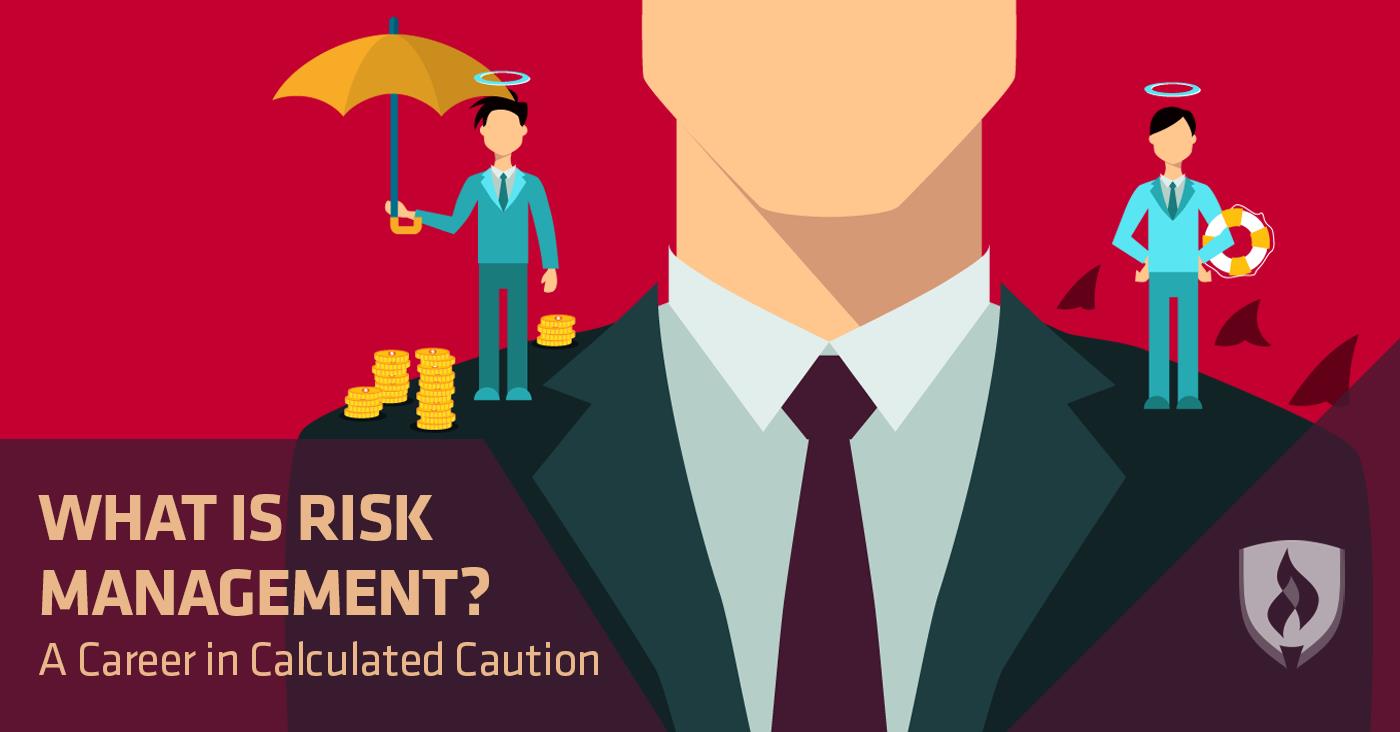
Your career seems to have plateaued. Rather than challenging you each day, your job leaves you yawning. It may pay the bills, but let’s face it: You’re bored. You’ve gained valuable business skills in your current position and you’re ready to put them to use by leveling-up your career.
You need an opportunity that leverages your existing abilities and builds on your past experiences. With the right training and education, risk management may be the job that fits the bill.
What is risk management? We spoke with the experts to bring you all the details you need to know about this exciting career. Hold on to your hat—this could be the job title that shakes up your ho-hum workday.
What is risk management exactly?
Risk is part of your life every single day. Individuals and businesses are constantly making choices that expose them to a certain amount of risk. Risk managers work with companies in a variety of industries to help minimize that risk. It’s their job to help a business avoid costly pitfalls and keep all their employees safe and healthy.
Risk managers identify, assess and report potential operational or financial risks, according to Spencer Knibbe, partner at MBK Search and 16-year risk management veteran. “They ensure that [the company] is aware of what can go wrong with the business,” Knibbe adds.
Risk can come in the form of anything from plunging stock prices or adjustments in the exchange rate to a spike in crime near the company’s property. This career is vital to companies who want to protect their financial position as well as their general business operations.
What do risk managers do?
Risk managers spend much of their time assessing and analyzing risk so they can communicate their findings to upper management. They should be comfortable working with numbers and running complex calculations since that makes up a large chunk of their job duties.
“In my job as a risk analyst, my duty was to monitor the overall portfolio risk of the company,” explains Paul Koger, former prop trading risk manager at Chase and trader at Foxytrades.com. Koger’s risk analysis work included plenty of statistical work and other calculations. “The main goal was to always be aware of the potential loss for the day, week and month,” he adds.
Risk managers are not only responsible for reporting risk, but for understanding it and seeking solutions when a risk limit is exceeded. “Some common duties of risk managers include working with business leaders to develop risk mitigation strategies to decrease exposure to risk and acting as an advisor to the board of directors on key strategic matters,” Knibbe says.
Where do risk managers work?
Since risk affects every person in every industry, risk managers have access to a wide variety of career options. Risk management careers can be found in industries spanning from health and wellness to space aviation and insurance.
Regardless of industry, most risk managers spend their time working in an office setting. Occasionally, risk managers may need to go “in the field” to assess levels of risk at a job site or similar situation. Risk managers may be expected to work long hours, though this largely depends on the industry and specific company you’re working for.
What skills do risk managers need?
The experts agree that having a head for numbers is a necessity if you have dreams of becoming a risk manager. “A fundamental understanding of your business” and its risk potential are also vital, according to Knibbe.
Risk management is about more than just having the right knowledge, however. Since much of their job involves advising executives about potential losses, risk managers must be excellent communicators and problem solvers, Knibbe says. Koger adds that self-confidence is also key to a successful risk management career. “This is vital to keeping a clear head and not being affected by other people’s opinions.”
It also doesn’t hurt to have a pessimistic side, Knibbe jokes. “By nature I am a pretty pessimistic person, so a job where I was able to find things that could go wrong was perfect for me,” he says.
How do you become a risk manager?
Aspiring risk managers should plan to obtain a Bachelor’s degree, especially in math-heavy fields such as finance or accounting. Some industries may have additional requirements, such as certain healthcare experience. Employers also prefer candidates with real-world experience in business or finance.
“A strong math-based education forms a strong basis for a potential job in risk management,” Koger advises. “My math and economics background combined with suitable personal traits were the main contributors to landing a job in risk management.”
You can also go the extra mile and become certified by the Institute of Risk Management. Though certification is not necessarily a job requirement, it can be a sign to potential employers that you take your career seriously.
Are you ready to take a chance on risk management?
There’s no denying that you need a job that takes your skills and potential to the next level. Now that you know what risk management is and what the profession entails, you may be thinking your existing experience has given you a foundation to pursue this exciting new career.
The first step to becoming a risk manager is obtaining a finance- or accounting-related Bachelor’s degree. Learn how you can earn your degree while continuing to work at your current job with our flexible program options.
RELATED ARTICLES:




